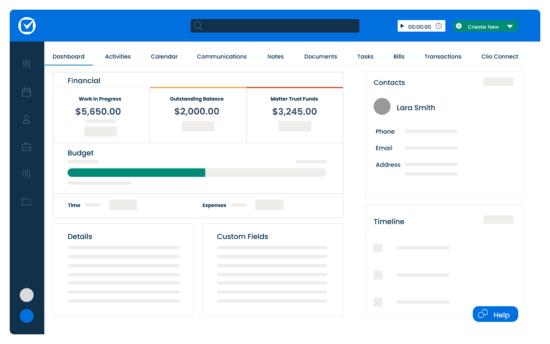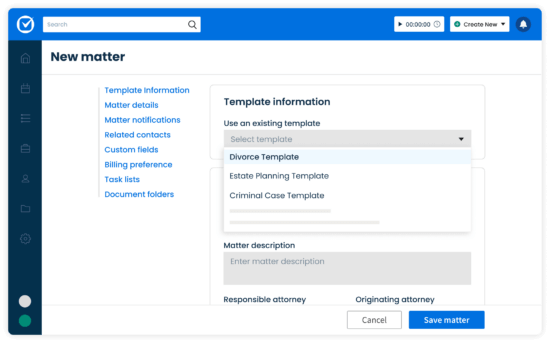Features of Clio’s legal case management system
Experience the power of the industry’s leading law firm case management software. With a centralized dashboard, you have a complete overview of all case information and link every contact, document, calendar event, note, time entry, and bill to the appropriate case to make your law practice management tasks flow as smoothly as possible.

-
Reduce redundant tasks
Streamline your legal practice with Clio cloud practice management, case management software to manage documents, bill, track time, and more: Get it all done faster, and with less risk of error, and so you can focus on the tasks that are the most important to your legal practice.
See it in Action -
Access every case detail from anywhere
Your documents, bills, client contact info, and more, can be accessed from any computer with an internet connection when you use Clio’s case management software. You can also download our mobile app for lawyering on the go.
Learn More -
Add case information from existing software
Log emails, file legal documents, and sync case details to Clio from over 250 other apps and software, including Outlook, GSuite, and Dropbox. Benefit from full integration for increased flexibility and smoother processing of legal cases.
Learn More
What lawyers say about our case management software
Trusted by 400,000+ legal professionals, and approved by 90+ bar associations and law societies worldwide, our legal case management tool is the clear choice amongst lawyers.
Collaborate on cases with lawyers and staff
Our legal case management software makes it easier to manage cases and gives every member of your law firm insight into what's happening. This makes collaborating on difficult cases and streamlining the day-to-day running of your practice a breeze.

-
Improve client and colleague communications
Use our case management software as your firm’s single source of truth. Set permissions to protect sensitive case details and communicate with clients and co-counsel with our secure online portals, Clio for Clients and Clio for Co-Counsel.
Learn More -
Track case progress at a glance
Set the status of a case to Open, Pending, or Closed. Use notes and secure messages to easily share updates on a case. And allow collaborations between colleagues for more efficient processing of cases.
Learn More -
See real-time case developments
Collaborate efficiently to do the best work for your clients. Track every change made to a legal case, including new time entries and documents. See who made what change and when.
See it in Action
Configure our legal matter management software to meet your law firm's needs
Enhance the way you work, save time on menial tasks, and focus on those that count for your legal practice.

-
Accelerate matter creation
Get more time back in your day with easy-to-use templates filled with preset information. Plus, improve consistency and accuracy of information across all your cases.
See How it Works -
Standardize tracking of key case details
Create custom data fields specific to your law firm’s processes or legal practice areas to collect, store, and search for case details efficiently. Use this information for document automation.
-
Organize cases the way you want
Attach custom categories, task lists, billing rates, payment profiles, budgets, and more to each of your legal cases.
-
Use online intake forms to populate case profiles
Create custom online intake forms with Clio Grow and sync them to Clio Manage to streamline the client intake process.
Learn More
Frequently Asked Questions
What is legal case management software?
Legal case management software is a digital tool that law firms use to manage their legal cases and clients and keep cases organized. It allows for a more streamlined workflow and smoother billing, time tracking, and document management processes, so you can focus on billable work.
What does legal case management software do?
Legal case management software provides you with an overview of your law firm’s cases and their affiliated details, including deadlines, documents, notes, bills, and more.
Legal case management solutions cover accounting, scheduling, time tracking, and more. All these are features that will help you manage your practice more efficiently, contribute to better cash flow management, and ease collaboration on cases. This will give you more time to work on tasks that will bring money into your legal practice.
What software do lawyers use?
Lawyers typically use several different types of software to run their firms. Your chosen legal software suite is the central and most important piece of the tech stack, but lawyers also use accounting software, such as QuickBooks Online or Xero, document software such as Microsoft Word, and an email provider such as Microsoft Outlook or Gmail. Law firms may also add other tools to fulfill needs more closely related to their practice area. The Clio App Directory has over 250 integrations to explore, so you can find out how it will integrate with the tools you are currently using.
Why should my law firm use case management software?
From automation to document creation, legal case management software keeps you organized on matters and cases, so you can manage more clients in less time and streamline your business at every step.
Case management solutions help lawyers spend more time focusing on practicing law and serving clients, and less time doing administrative and non-billable tasks.
What is the best legal case management software?
The best legal case management software should have the features that help be efficient, like billing, case management, calendaring, accounting, task management, online payments, time and expense tracking, and document management. You’ll also want to look for reviews and testimonials to ensure that you’re truly choosing the industry’s best case management software.
For instance, trusted by over 150,000 legal professionals, and approved by over 90 bar associations and law societies worldwide, Clio is widely considered to be the leading case management solution with a rating of 4.5/5 or higher on G2 Crowd, SoftwareAdvice.com, Capterra, and Lawyerist.
What kind of customer support is included?
We offer unlimited support 24 hours a day, 5 days a week, so we can answer any questions you might have without impairing your working day.
How do I transfer my current cases into my new software?
Our data migration team can assist in bringing over information from another legal case management solution to our software so that you don’t have to do it manually.
How much does case management software cost?
The cost varies greatly, depending on whether you’re using an on-premise or cloud-based solution. Cloud solutions tend to be more cost-effective for most firms, with their low monthly pricing models, free support, and free updates.
Our legal case management software offers different pricing plans starting at $39 a month. We want to ensure firms of all sizes and requirements can find a solution that meets their needs.
What features does legal case management software have?
The following are all crucial features to look for in legal software packages. We have listed all these features below so you know what you are looking for when the time comes to implement a software solution at your practice.
Case management: The ability to manage clients and cases and keep all case information organized. This enables you to quickly refer to notes about the case and prepare for court in the most efficient way possible.
Client/contact management: Case management also takes place on a per-client or per-contact basis, so managing your face to meetings and calls with the client is crucial.
Task management: The ability to create and assign tasks to different staff and lawyers. Sophisticated solutions like our legal case software can automate parts of this process when a case is created. Our software suite even allows you to automate the billing process so you can reduce any potential cash flow problems you might encounter.
Calendar: Your case management tool needs a full calendar with capabilities to manage your busy schedule, as well as sharing your calendar with colleagues. That way you can avoid possible dreaded meeting room clashes.
Timekeeping: The ability to enter time as you work or after the fact. Case management software with timers helps you capture more billable time while you work. This means you will be able to streamline your billing process and keep on top of all the cases your practice handles.
Email: Your legal case software should integrate with your chosen email provider. This makes it easier for lawyers to file emails to cases and follow-up on any developments. Another email feature you might be interested in is whether your chosen software can create a database of email addresses for each case the lawyers at your practice are currently working on.
Document management: Can you use it to organize and store documents, and collaborate on them? Does it integrate with GSuite or your Microsoft Office package? These are questions that need answering so you can fully integrate your chosen software solution into your workflow.
Document automation: Many case management softwares allow you to use templates to automatically create new documents, saving lawyers valuable time.
Accounting: Your legal case software may not have a full accounting solution, but you should be able to reconcile accounts and view balances and transactions. You can also use the software to set up invoice reminders and automate the collections process. Therefore, this reduces the time you spend chasing up invoices, asking lawyers to send out invoices or getting invoices validated.
Trust accounting: The ability to track transactions related to operating accounts and trust accounts separately. The software should also allow you to send notifications through to trustees when their account has reached the minimum amount and needs topping up.
Invoicing and billing: Your practice management software should help you seamlessly generate bills and send them to clients. This saves you considerable time and money and allowing you to focus on the more important tasks like answering client questions and reassuring clients.
Online credit card payments: More and more clients want to pay their lawyers via credit card or online. Your practice management software should offer the option to process payments via credit card, making it more convenient for your clients.
Client portal: For sharing sensitive files and communications, an encrypted client portal with your case management software is the best option for ensuring client information is kept confidential. This portal should also allow you to schedule client appointments and phone calls so that you can make sure they are well looked after, therefore, contributing to building up a solid business relationship with your clients.
Integrations: Your practice management software is the central hub for your law firm, but it needs to connect with the tools you already use and tools you might want to use in the future. You need to make sure it connects to your email client, your accounting software, and any other tools you need. Integrating all those tools will allow for a smoother workflow and increased productivity.
Reports: How is your firm doing financially? How are you tracking against your goals? Your practice management software should be able to give you key business insights to answer these questions. It should provide you with options to automate these reports or to email them through to you on a scheduled date.
How do you choose a legal case management software?
Choosing an attorney case management software suite is important as it has the potential to simplify your processes. Start by identifying the gaps in your practice and see if software like Clio is able to plug them. It’s best if all of the tools in your legal tech stack integrate and share case and contact information to reduce the need for duplicate data entry and risk of error.
What’s a settlement calculator?
A settlement calculator offers potential estimated amounts a defendant might offer to settle a personal injury or wrongful death lawsuit. A settlement calculator will take into account any deductions including, medical and non-medical liens, expenses, and legal fees when calculating the final recovery.
How can I log settlements in Clio?
Clio allows you to enter medical bills and mark them as liens in the medical record tab. You can also add expenses as to the activities tab. Both of these touch points will automatically be pulled into your settlement calculator. To log a settlement, you can navigate to the settlement tab on the appropriate matter, Clio ‘New Recovery’ include a source, such as an insurance company, and add the recovery amount. You can choose to deduct your legal fee or waive it and click save. The settlement calculator will show you the total recovery, net amount to your client, as wells as any deductions. You can add additional expenses or liens and make reductions on medical liens in the settlement tab as well.
What are deducted calculations?
Deducted calculations are expenses and liens that are deducted from the final recovery amount of the proposed settlement.
What are gross calculations?
A gross calculation is the total recovery on a matter before deductions.
Legal case management resources
More Clio Manage features
-
Case Management
Stay organized, and access the information you need—from anywhere, at any time.
-
Document Management
Edit, store, and organize your legal documents securely, from anywhere.
-
Artificial Intelligence
Work smarter with AI: Turn routine work into completed actions—built right into Clio.
-
Billing
Create custom bill plans based on fee structure and reduce manual data entry. Bill via email or our secure client portal. Leverage legal AI to generate bills automatically and route them to the right approvers.
-
Client Management
Easily organize contact details, documents, and communication logs from intake to invoice.
-
Calendaring
Meet every deadline, with legal-specific features like automatic court date scheduling.
-
Task Management
Manage firm productivity by assigning and tracking task completion.
-
Online Payments
Make it easy to pay and get paid with online payments.
-
Time & Expense Tracking
Seamlessly track time and expenses to make billing simple and accurate.
-
Law Firm Reporting
Unlock deeper insights with Custom Reports in Clio Manage. Filter, group, preview, and schedule reports that align with how your law firm works—faster.
-
Client Portal
Enable clients to securely communicate and collaborate with their lawyer from desktop or mobile.
-
Law Firm Communications
Manage client and firm communication all on one platform.
-
Personal Injury
Close cases faster by organizing medical liens, damages, and settlements alongside your case files.
-
Trust Account Management
Simplify legal trust account management with Clio and stay compliant with state bar regulations.

Book a Live Demo
Book a live demo to see how Clio can help your law firm maximize efficiency and increase revenue
Try Clio for Free
Try Clio’s legal software free for 7 days with no obligation. Easy setup. No credit card required. Cancel anytime


